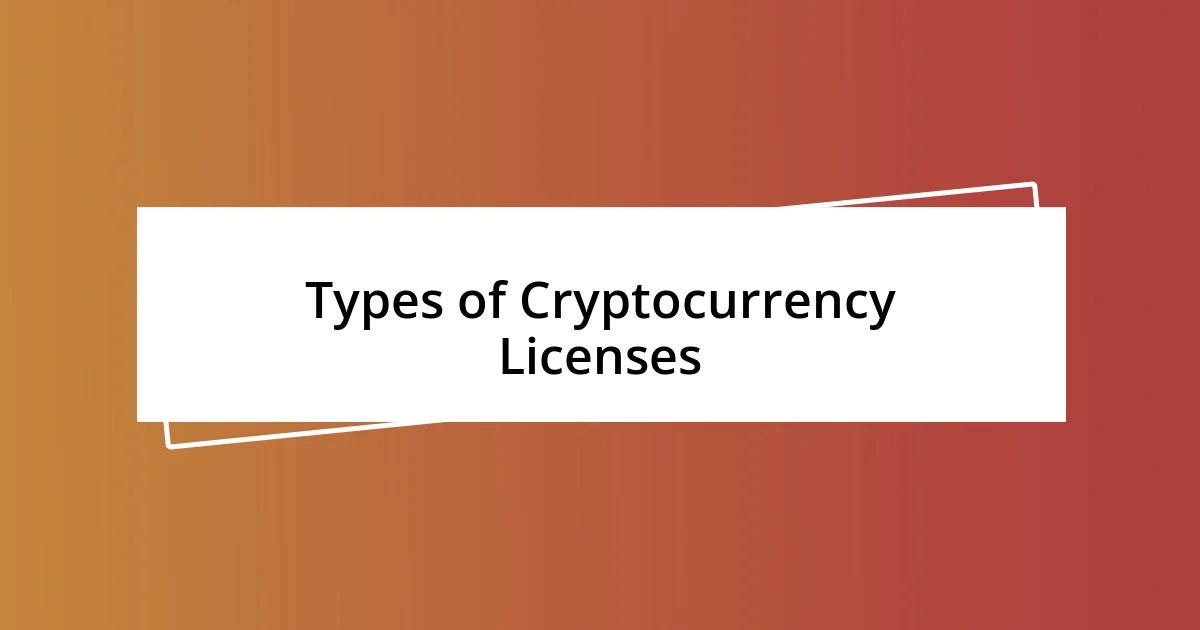Key takeaways:
- Licensing enhances credibility and user trust in cryptocurrency platforms, promoting safety and regulatory compliance.
- Different types of licenses (Virtual Currency, Money Transmitter, Securities) cater to various business models and operational needs.
- Future trends include standardized regulations, increased consumer protection, and the integration of innovative technologies for enhanced compliance management.

Understanding Cryptocurrency Licensing
Cryptocurrency licensing can feel like wading through a labyrinth, especially for newcomers like I once was. When I first encountered licensing requirements, it was daunting. I remember thinking, “How do I even start?” Each jurisdiction has its own rules, creating a patchwork of regulations that can be both challenging and fascinating to navigate.
One aspect that truly stood out to me was the impact of licensing on credibility. In my experience, obtaining a license not only enhances a company’s reputation but also builds trust with users. Can you imagine using an exchange that isn’t licensed? The assurance of regulation can make all the difference, transforming a suspicious transaction into a confident investment.
As I delved deeper, I realized that licensing isn’t just a bureaucratic hurdle; it represents a commitment to safety and compliance in an often turbulent industry. I’ve seen firsthand how licensed entities work harder to adhere to anti-money laundering (AML) and know your customer (KYC) regulations. It’s like creating a safety net for both the business and its customers — wouldn’t you want to feel that extra layer of security when handling your assets?

Importance of Licensing in Crypto
The importance of licensing in the cryptocurrency space cannot be overstated. I remember the first time I learned about the regulations governing crypto exchanges; it felt enlightening. I realized that a licensed exchange not only protects users but also fosters a healthier market. Obtaining a license signals a commitment to ethical practices and often leads to higher standards in transaction security. It’s reassuring, isn’t it, to know that there’s a framework in place to safeguard our investments?
Here are a few reasons why licensing is crucial in crypto:
- User Trust: Licensed platforms inspire confidence among users, making them more likely to engage.
- Legal Compliance: Adhering to licensing requirements helps avoid legal troubles, ensuring long-term viability.
- Enhanced Security Measures: Licensed companies are usually required to implement robust security protocols.
- Reputation Building: A license elevates a company’s standing in the industry, attracting more customers.
- Prevention of Fraud: Strict regulatory standards help deter fraudulent activities, safeguarding users’ assets.
I’ve seen my fair share of unlicensed platforms, and let me tell you, every sketchy deal felt like a gamble. In contrast, licensed services gave me peace of mind, allowing me to focus on making informed decisions rather than worrying about potential pitfalls.

Types of Cryptocurrency Licenses
When it comes to cryptocurrency licenses, there are several types that cater to different business models and operational needs. For instance, I’ve encountered the “Virtual Currency License,” which is commonly used by exchanges and wallet providers. This type requires rigorous compliance with regulations, which can seem intimidating at first, but I’ve found that it significantly boosts user trust. It’s amazing how having the right license can elevate your platform in the eyes of users.
Another type that has caught my attention is the “Money Transmitter License.” I’ve seen many startups opt for this license to allow the transfer of currency and assets. It can open up additional revenue streams, yet it often involves complex compliance measures. From my experience, navigating these requirements can feel overwhelming, but the benefits—such as an expanded user base—are well worth the effort.
Lastly, there’s the “Securities License,” which is vital for businesses dealing with tokens classified as securities. I remember grappling with this concept myself; it’s crucial to understand that how you structure your token can dictate the need for this type of license. It’s fascinating how such nuances in regulations can impact a business strategy and user engagement.
| Type of License | Description |
|---|---|
| Virtual Currency License | Required for cryptocurrency exchanges and wallet providers, it enhances user trust through compliance. |
| Money Transmitter License | Enables the transfer of digital assets, providing additional revenue opportunities but involves complex regulations. |
| Securities License | Necessary for dealing with tokens classified as securities, impacting business structure and strategies. |

Steps to Obtain a License
Obtaining a cryptocurrency license can seem like a daunting task, but breaking it down into manageable steps helps ease the pressure. First, I found it essential to identify the specific license needed based on my business model. From my own experience, this initial step could be quite revealing—sometimes, I realized I was more suited for a different license than I originally thought, and that clarity set me up to sail smoothly toward compliance.
The next step involves gathering the necessary documentation, a process that can be tedious but rewarding. I remember sifting through mountains of paperwork, from financial records to personal identification. It felt overwhelming at times, but I learned that having everything organized not only speeds up the application process but also shows regulators that you mean business. Have you ever felt a real sense of accomplishment when you tick off each document on a checklist? That’s exactly how I felt each time I put another piece of paper together.
Finally, the application submission comes into play, a moment both thrilling and nerve-wracking. After hitting the “submit” button, I took a deep breath, knowing that I had done everything I could to comply. Waiting for a response is like holding your breath, filled with equal parts excitement and anxiety. In those moments, I often reminded myself of the importance of patience—after all, what’s a few weeks for a license that opens up an entire world of opportunities?

Challenges in License Acquisition
Acquiring the necessary licenses for cryptocurrency can often feel like navigating a labyrinth. One major challenge I faced was understanding the constantly shifting regulatory landscape; it seems like every week there’s a new guideline or requirement. Have you ever felt like you’re one step forward and two steps back? That’s exactly the mindset I adopted during my journey—constantly adapting and learning just to keep pace with the rules.
Another hurdle is the sheer volume of legal and financial documentation required. When I was compiling my files, I felt like I needed a personal assistant just to manage the paperwork! It’s mind-boggling how regulations can require everything from a thorough background check to a detailed financial audit. I remember staring at my papers and wondering which ones would truly make a difference in the approval process. It can feel overwhelming, yet that commitment to transparency is what sets serious players apart in this space.
Then there’s the timeline for acquisition, which can stretch into months. The waiting game was one of the hardest parts for me. I found myself constantly checking my email, anticipating a response, and imagining all the possibilities that come with a successful application. This waiting period can definitely test your resolve. How do you maintain motivation during such a drawn-out process? For me, setting small milestones helped keep the fire alive, ensuring I was always looking forward while managing my anxiety.

Best Practices for Compliance
Compliance in the realm of cryptocurrency is not just about ticking boxes; it’s about creating a culture of transparency and integrity. One practice that has profoundly impacted my journey is establishing a compliance team. Early on, I thought I could handle everything myself, but the complexity of regulations quickly showed me the value of having knowledgeable people in the trenches. Have you ever tried to do too much alone? Delegating compliance responsibilities not only lightened my load but also ensured we had diverse perspectives on legal matters.
Engaging with legal experts is another best practice I wholeheartedly advocate. During my licensing process, I sought advice from a specialized attorney who helped me interpret regulations that seemed like a foreign language. I felt a wave of relief when I realized I wasn’t navigating these waters solo anymore. Have you ever felt that spark of confidence when someone with expertise has your back? Their insights not only clarified compliance requirements but also helped me identify areas where I could fortify my operations.
Lastly, I found regular audits to be instrumental in maintaining compliance. Initially, I resisted the idea, thinking it would be a waste of resources—what could possibly go wrong if everything felt right? However, after implementing periodic internal audits, I discovered potential issues before they escalated. Reflecting on those audits, I could confidently say they transformed my perspective on compliance from a daunting task to a proactive approach. What’s your take on being one step ahead? For me, it has made all the difference, nurturing a proactive culture that keeps compliance top of mind.

Future Trends in Cryptocurrency Licensing
As I look ahead, a significant trend I see in cryptocurrency licensing is the emergence of more standardized regulations across jurisdictions. I’ve noticed that countries are starting to collaborate more, sharing best practices in an effort to create a cohesive framework. This shift makes me hopeful; it means that future newcomers might navigate regulations with relative ease compared to my experience. Have you ever imagined how much smoother your journey could be with clearer instructions?
Another notable trend is the increasing emphasis on consumer protection. As the market matures, so does the expectation that companies prioritize safeguarding their clients. I recall a time when I underestimated the weight of customer trust in my licensing journey. However, realizing that transparency can be a competitive advantage changed my approach. What if we all viewed consumer protection not just as a regulatory requirement but as an opportunity for growth? I believe that fostering this mindset will encourage more robust compliance practices.
Lastly, innovative technologies such as blockchain analytics are likely to transform how we approach compliance in the future. I’ve felt the anxiety of ensuring every transaction is compliant, and I can only imagine how these advanced tools could simplify that process. With real-time monitoring and reporting, companies can address compliance issues before they escalate. Isn’t it exciting to think about how, in a few years, we might have seamless reporting systems that ease our burdens as operators? These trends promise a more streamlined and proactive environment for all of us in the cryptocurrency space.












